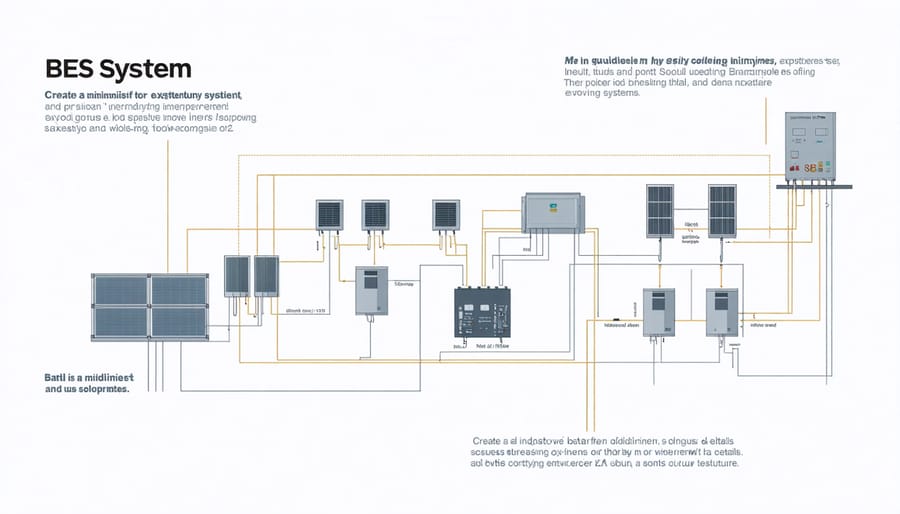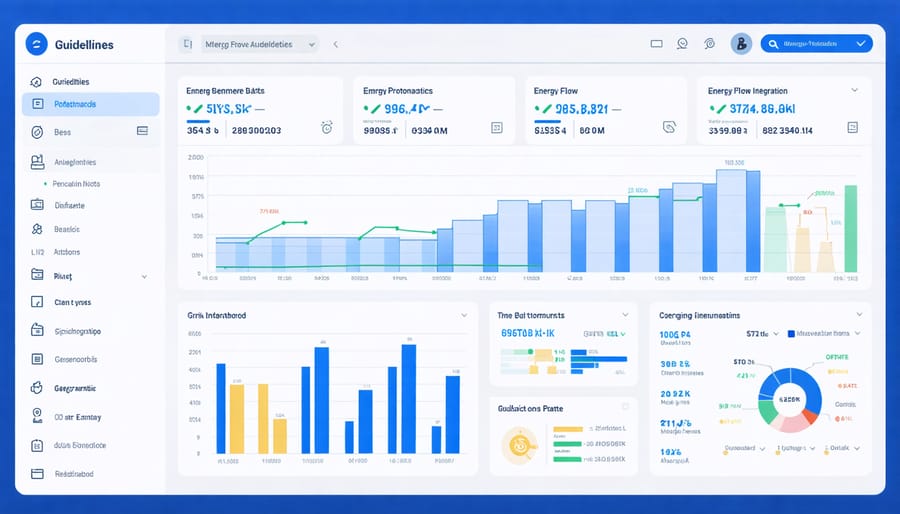How BESS Energy Management Systems Are Revolutionizing Solar Power Storage

Battery Energy Storage Systems (BESS) represent a transformative leap in modern energy management, revolutionizing how we harness and distribute power from renewable sources. As the cornerstone of hybrid solar systems, BESS technology enables precise control over energy flow, storage, and distribution while maximizing the return on renewable energy investments.
Today’s sophisticated BESS solutions combine advanced battery technology with intelligent software systems to orchestrate power flow, optimize energy consumption patterns, and ensure reliable backup power during grid outages. This integration creates a dynamic ecosystem where energy can be stored during peak production periods and deployed strategically when demand or electricity prices surge.
For European businesses and homeowners, BESS represents more than just energy storage – it’s a gateway to energy independence, reduced utility costs, and enhanced grid stability. By implementing smart energy management strategies through BESS, organizations can actively participate in demand response programs, capitalize on time-of-use pricing, and contribute to a more sustainable energy future while maintaining operational reliability.
The Core Components of BESS Energy Management

Battery Storage Technology
Modern battery storage technology has evolved significantly, offering diverse solutions for energy management systems. The most prevalent types include lithium-ion batteries, which dominate the market due to their high energy density, longer lifespan, and decreasing costs. These batteries typically offer 85-95% round-trip efficiency and can last 10-15 years under optimal conditions.
Flow batteries represent another innovative option, particularly suitable for large-scale industrial applications. Though less common in residential settings, they excel in long-duration storage and can operate effectively for 20+ years with minimal degradation.
Storage capabilities vary significantly based on battery chemistry and design. Residential systems commonly range from 5-15 kWh, while commercial installations can scale from 50 kWh to several MWh. Modern lithium-ion systems can deliver both high power output for peak demands and sustained energy release for longer-term needs.
Key considerations for storage selection include:
– Depth of discharge capabilities
– Cycle life expectations
– Operating temperature range
– Response time
– Maintenance requirements
European manufacturers have made significant strides in developing advanced battery management systems that optimize performance while adhering to strict safety standards. These systems continuously monitor cell health, temperature, and charge states to ensure optimal operation and longevity.
Smart Control Systems
Modern BESS installations rely on sophisticated control systems that serve as the brain of the entire operation. These intelligent management platforms monitor, analyze, and optimize energy flow in real-time, ensuring maximum efficiency and system longevity. The software interface provides users with comprehensive visibility into their energy storage system’s performance through intuitive dashboards and detailed analytics.
Key features typically include real-time monitoring of battery state of charge, power flow management, and predictive maintenance alerts. Advanced algorithms continuously optimize charging and discharging cycles based on various factors, including energy demand patterns, electricity prices, and weather forecasts. This smart approach helps maximize self-consumption of renewable energy while reducing operating costs.
The control systems also offer remote management capabilities, allowing operators to adjust settings and respond to system changes from anywhere. Built-in safety protocols automatically protect the battery system from potential issues like overcharging or extreme temperatures. Many platforms now incorporate machine learning capabilities that improve system performance over time by learning from usage patterns and environmental conditions.
For enhanced reliability, these systems often include redundant monitoring and multiple communication protocols. Regular automated reporting helps users track system performance, energy savings, and return on investment, while simplified maintenance scheduling ensures optimal system health throughout its lifetime.
Optimizing Solar Energy with BESS Management
Peak Load Management
Peak load management represents a crucial function of BESS energy management systems, enabling organizations to effectively handle periods of high energy demand while maintaining operational stability and cost efficiency. Through smart energy management, BESS systems can predict and respond to peak demand periods, automatically adjusting energy distribution to prevent grid strain and costly demand charges.
During peak hours, when electricity rates are typically highest, the BESS system strategically releases stored energy to supplement grid power. This process, known as peak shaving, helps maintain consistent power supply while reducing dependency on expensive grid electricity during critical periods. The system’s sophisticated algorithms analyze historical usage patterns, weather data, and real-time consumption metrics to optimize when to store and deploy energy.
For European businesses and industries, this capability translates into substantial cost savings, as peak demand charges can constitute up to 30% of monthly electricity bills. The system’s predictive analytics ensure that sufficient energy is always available during high-demand periods, while its automated response mechanisms maintain optimal performance without requiring manual intervention.
Additionally, peak load management through BESS contributes to grid stability by reducing the strain on local power infrastructure during peak hours. This not only benefits individual facilities but also supports community-wide energy resilience and sustainability goals, aligning with European Union’s renewable energy initiatives and carbon reduction targets.
Grid Integration Features
A well-designed BESS energy management system seamlessly integrates with existing power infrastructure, enabling smooth coordination between various grid components. This integration capability is crucial for maintaining grid stability and optimising energy flow between storage systems, renewable sources, and the main power grid.
Modern BESS solutions incorporate advanced grid-forming inverters that can establish reference voltage and frequency, allowing them to operate independently or in parallel with the main grid. This feature is particularly valuable in European markets, where grid codes and regulations demand sophisticated power quality management and reactive power control.
The system’s grid integration features include real-time monitoring and automated response mechanisms that adjust to grid conditions. During peak demand periods, the BESS can instantly provide additional power to support grid stability. Conversely, during low-demand periods or when renewable energy production is high, the system efficiently stores excess energy for later use.
Smart grid connectivity enables these systems to participate in demand response programmes and grid services, creating additional value streams for system owners. The integration capabilities extend to communication protocols like MODBUS, IEC 61850, and SCADA systems, ensuring compatibility with existing utility infrastructure and energy management platforms.
For European businesses and industries, these integration features translate into enhanced energy security and reduced grid dependency. The system’s ability to provide uninterrupted power supply during grid disturbances while maintaining power quality standards makes it an essential component of modern energy infrastructure.
Advanced forecasting algorithms and machine learning capabilities further optimise grid integration by predicting energy demands and renewable generation patterns, allowing for proactive system management and improved overall efficiency.

Real-World Benefits for European Users

Residential Applications
BESS energy management systems are revolutionising how European homeowners handle their energy consumption and storage needs. These systems integrate seamlessly with residential solar installations, offering homeowners unprecedented control over their energy usage and costs.
For residential applications, BESS provides several key benefits. Firstly, it enables homeowners to store excess solar energy generated during peak sunlight hours for use during evenings or cloudy days. This capability significantly reduces dependency on grid power and maximises self-consumption of solar energy.
The system’s smart monitoring features allow residents to track their energy usage patterns in real-time through user-friendly mobile applications. Homeowners can make informed decisions about when to use stored energy versus grid power, optimising their electricity consumption for maximum cost savings.
During power outages, BESS serves as a reliable backup power source, ensuring essential household appliances remain operational. The system automatically switches to battery power when grid failures occur, providing seamless power transition and peace of mind for families.
Modern BESS solutions also support dynamic electricity tariff management. Homeowners can charge their batteries during off-peak hours when electricity rates are lower and use stored energy during peak-rate periods, resulting in substantial savings on energy bills.
Additionally, these systems are designed for easy installation and minimal maintenance, making them an attractive investment for residential properties. With scalable configurations, homeowners can choose a system size that matches their specific energy needs and budget.
Commercial Implementation
Implementing BESS in commercial settings offers substantial advantages for businesses seeking efficient commercial energy management solutions. The system’s ability to store excess energy during off-peak hours and deploy it during high-demand periods results in significant cost savings through peak shaving and demand charge reduction.
For industrial users, BESS provides crucial power quality improvements and uninterrupted power supply capabilities, essential for maintaining continuous operations. Manufacturing facilities can optimize their energy consumption patterns, reducing strain on the grid while ensuring production stability. The system’s smart load management features enable businesses to participate in demand response programs, creating additional revenue streams.
The scalability of BESS makes it particularly attractive for growing enterprises. Companies can start with a modest installation and expand capacity as their energy needs evolve. Integration with existing renewable energy infrastructure, such as solar panels or wind turbines, maximizes return on investment while supporting corporate sustainability goals.
Modern BESS implementations also include advanced monitoring and predictive maintenance features, helping facility managers optimize system performance and prevent costly downtime. This proactive approach to energy management aligns with European sustainability standards while delivering tangible operational benefits.
Future-Proofing Your Solar Investment
Investing in a BESS energy management system is not just about meeting today’s energy needs – it’s about preparing for tomorrow’s energy landscape. Modern BESS solutions are designed with scalability and adaptability at their core, ensuring your investment maintains its value and relevance for years to come.
One of the key aspects of future-proofing lies in the modular nature of contemporary BESS installations. As your energy needs grow or change, the system can be expanded or reconfigured without requiring a complete overhaul. This flexibility extends to both storage capacity and power output capabilities, allowing for strategic upgrades that align with evolving requirements.
Software plays a crucial role in maintaining long-term value. BESS platforms typically receive regular firmware updates that enhance system performance, introduce new features, and strengthen cybersecurity measures. These updates ensure your system continues to operate at peak efficiency while adapting to new grid requirements and energy market opportunities.
The integration capabilities of BESS systems are particularly noteworthy for future sustainability. Modern systems are designed to work seamlessly with emerging technologies, from smart home devices to electric vehicle charging infrastructure. This interoperability ensures your investment remains relevant as the energy ecosystem evolves.
From a regulatory perspective, BESS systems are well-positioned to meet future energy standards. European regulations increasingly favour integrated energy storage solutions, and BESS systems are designed to comply with both current and anticipated regulatory frameworks. This compliance readiness protects your investment from potential regulatory changes.
For businesses and industries, BESS systems offer strategic advantages in terms of future energy cost management. As energy markets continue to evolve, having a flexible storage system enables participation in emerging revenue streams, such as grid services and demand response programs. The ability to adapt to new market opportunities ensures ongoing financial benefits from your investment.
When selecting a BESS solution, consider working with providers who offer comprehensive maintenance plans and technology roadmaps. This approach ensures your system remains optimised and up-to-date throughout its operational lifetime, maximising both performance and return on investment.
In today’s rapidly evolving energy landscape, BESS energy management systems stand as a crucial cornerstone for achieving sustainable and efficient power solutions. Throughout this discussion, we’ve explored how these sophisticated systems optimize battery storage performance, enhance grid stability, and deliver substantial cost savings for both residential and commercial applications across Europe.
The integration of BESS technology represents more than just an energy storage solution; it’s a strategic investment in energy independence and sustainability. By enabling smart energy management, peak shaving, and seamless integration with renewable sources, BESS systems are actively shaping the future of energy consumption and distribution throughout the European market.
For homeowners and businesses considering BESS implementation, the benefits are clear: reduced energy costs, increased grid reliability, and improved environmental impact. The technology’s ability to provide backup power, optimize self-consumption, and participate in demand response programs makes it an invaluable asset in modern energy management strategies.
As Europe continues its transition toward renewable energy, the role of BESS will only grow in importance. Whether you’re a homeowner looking to maximize your solar investment or a business seeking to optimize energy costs, now is the time to explore BESS solutions. With continued technological advancements and increasing market maturity, BESS energy management systems offer a proven path to energy efficiency and sustainability for European consumers and businesses alike.
Take the next step in your energy management journey by consulting with qualified BESS providers who can tailor a solution to your specific needs and requirements.
Leave a Reply